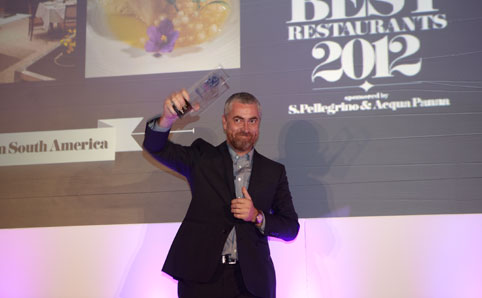
Skip to Alex Atala's pick of the city | Anthony Bourdain's thoughts on Atala
What does winning fourth place in the World’s Best Restaurants awards mean to you?
It’s a dream I never dreamed of – I never imagined I’d reach this point. I went to London thinking we were going to fall in the rankings.
Why?
Because the rest of the world works in an extremely organised way these days. Take England – some of the chefs and I met with [Prime Minister] David Cameron, because England is making a huge effort to promote ingredients from the British kitchen. What Peru and the Nordic countries are doing is exceptional, too. But Brazil? Nothing.
We’re still like Indians with bows and arrows. So you know you’re competing with people who have lots of support and are amazingly organised, and you go in alone, never imagining... You don’t enter into a fight thinking that you’re going to win (laughs).
It’s even better, then.
Even better. It was a great moment.
Reaching this position, with all the media attention it brings, must give you a platform to speak about whatever you like.
I think so. Last year I was number seven in the world, which is already a lot. But I didn’t have to give any interviews – nobody came, no one even wanted to know. In the few magazines that wrote about it, some of them lied, saying that I had increased my prices.
But this year, there’s been a great reception, lots of people wanting to talk and listen – this award really generates interest, and it becomes a platform from which to dream even higher. And that dream isn’t moving higher up on the list, but using Brazilian ingredients to benefit our culture, to benefit our people, and who knows, maybe even protect our environment.
From what I’ve been hearing and reading since the announcement of the prize, it seems that people here in Brazil feel extremely proud of you.
It makes me happy. This recognition, this opening up – seeing people becoming emotionally engaged is wonderful. But for me, it’s the same fight it has always been. I already felt this way – I’m stubborn, and I’ve always wanted to fight for this.
Speaking of Brazilian cuisine, what is it that distinguishes it from other cuisines?
Well, the raw materials are just amazing, don’t you think? The country is distinguished by the quality and potential of its products. And there are some incredible ingredients here that people can only understand if they come to Brazil.
For example, the whole world knows about cashew nuts, but nobody ever imagines that cashew nuts and the caju fruit come as a package. I think Brazil has a lot of surprises to offer the world – and all the exotic produce from Amazônia and our exotic fruits match the exotic image people already have of Brazil.
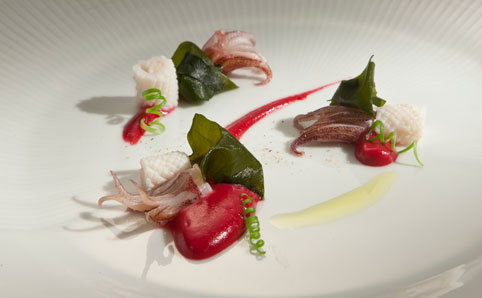 |
| A symphony in flavours: a squid dish at D.O.M. |
Is there any flavour in particular that says ‘Brazil’?
That’s really hard. Brazil is a continental country, so you find lots of flavours that represent particular regions of Brazil. But you could say Amazônia with tucupi, chicole do Pará, pimenta de cheiro – you just close your eyes and you feel like you’re there. Or pequi fruit from the savannah. In Bahia, it has to be the dendê palm oil. If it’s chimarrão [maté tea] and beef, then it’s a barbecue – that’s the flavour of the south of Brazil. Cheese bread with coffee or cornbread: Minas Gerais.
You can travel the whole of Brazil through its flavours, and that’s something incredibly clear: that culture is expressed and can be exported through these ingredients.
Does the foreign palate need to be trained to understand some of these flavours?
Look: yes and no. Take something that’s typically Brazilian, farofa [toasted manioc flour]. For people who have never discovered farofa on their plates before, it’s something very new, and sometimes the experience can cause a new, and not always pleasant, sensation. So in that sense, perhaps it does. But if you think about it, twenty or thirty years ago it seemed strange to eat raw fish, and yet today it’s very common.
I find people incredibly open to understanding the Brazilian experience. Brazil’s an extremely charismatic country, and it’s already lodged in the subconscious of a lot of people all over the world. And then, Brazil is experiencing a good economic moment right now, and that generates even more interest. People are very open to Brazil.
D.O.M. has become a destination dining experience – there are people who wouldn’t dream of coming to São Paulo without trying it. If you could name one other place they should try, what would it be?
Wow, I could make a whole list. But I’d have to say it’s Mocotó, Maní and Epice – those are three restaurants that people shouldn’t miss when they come to São Paulo. But they should also at least pass by a churrascaria [steakhouse] to try a rodízio [all-you-can-eat barbecue meat].
What other places should they visit, restaurants aside?
They shouldn’t miss the Choque Cultural gallery, and they should definitely see some of the graffiti. São Paulo’s urban art is a phenomenon. Artists like Os Gêmeos, Espeto, Zezão – what those guys are doing is really amazing. It’s the pride of the city.
How did you celebrate the award over there in London?
I went out with the chefs. There’s always an after-party.
Do you have friends amongst the other chefs at the awards?
Lots. There’s a real sense of fraternity between us. Andoni [of Mugaritz, Spain], René [of Noma, Denmark], Massimo Bottura [Osteria Francescana, Italy], David Chang [Momofuku, New York], and Claude Bosi [Hibiscus, London] are all great friends.
And of the other restaurants on the ‘50 Best’ list, which ones do you have a culinary affinity with?
Mugaritz, maybe. Noma without a doubt, because we both use regional ingredients unknown to the general public. We also both first appeared on the list the same year. So René and I became great friends.
Have you got anything new lined up for the coming year?
No, for now I just want to keep up what we’re doing. Although quite soon, I’m going to start selling products in a space at [Atala’s other restaurant] Dalva e Dito, and I’m also going to make the food available for takeout. Anyone who wants to can come by, and it will cost less than eating inside the restaurant.
D.O.M. is at Barão de Capanema 549, Jardim Paulista, (11) 3088 0761, domrestaurante.com.br. Read more on D.O.M.
Dalva e Dito is at Rua Padre João Manuel 1115, Jardim Paulista, (11) 3068 4444, dalvaedito.com.br. Read more on Dalva e Dito
Alex Atala's city picks
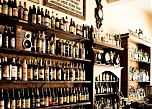 Mocotó
Mocotó
Avenida Nossa Senhora do Loreto 1100, Vila Medeiros, (11) 2951 3056, mocoto.com.br
'For a real immersion into Brazil's regional cuisine.' Read more on Mocotó
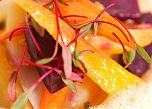 Maní
Maní
Maní is at Rua Joaquim Antunes 210, Pinheiros, (11) 3062 7458, manimanioca.com.br
‘Beyond the quality food, it has a joviality, a balance between young and casual that is interesting.’ Read more on Maní
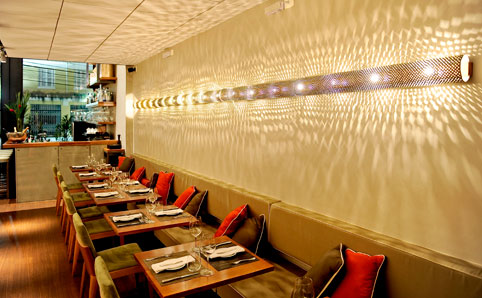 Epice
Epice
Rua Haddock Lobo 1002, Jardim Paulista, (11) 3062 0866, epicerestaurante.com.br
‘Alberto [Landgraf] is a talented young guy, creating food with a lot of technique.’ Read our interview with Alberto Landgraf
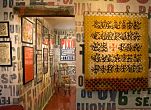 Choque Cultural
Choque Cultural
Rua João Moura 997, Pinheiros, (11) 3061 4051, choquecultural.com.br
‘People shouldn’t miss this gallery, and they should definitely see some of the graffiti. It’s a phenomenon.' Read more on Choque Cultural
- In town filming an episode of his new TV series The Layover, Anthony Bourdain dined at D.O.M. We asked him how Atala fits into the world's gastronomy scene. Read our mini interview

